Packaging is an essential aspect of product marketing, serving as the first point of contact between a consumer and a product. Glass Packaging is a kind of packaging that has the power to attract attention, build brand identity, and influence consumer behaviour. As such, businesses are increasingly investing time and resources into creating packaging that not only protects the product but also enhances its appeal.
One type of packaging that has emerged as a highly effective marketing tool is glass packaging. Glass bottles have become increasingly popular in industries such as food, beverages, and cosmetics, where product quality and appearance are crucial. Glass Bottle Manufacturers and Glass Bottle Wholesalers have recognized this trend and are providing businesses with a wide range of glass packaging options to suit their specific needs.
In this blog post, we will explore the impact of glass packaging on product marketing by analysing case studies and examples that demonstrate its effectiveness in building brand identity, increasing sales, and promoting sustainability.
Case Study 1- The Great Soft Drink Glass Packaging Story
Coca-Cola, one of the world’s most recognizable brands, has been using glass bottles for more than a century. The company understands the importance of packaging in building brand identity and has leveraged glass packaging to create a strong association with its brand. The iconic
Coca-Cola glass bottle is instantly recognizable, and the company has used it to create an
emotional connection with consumers.
In 2016, Coca-Cola launched a marketing campaign called “Taste the Feeling,” which showcased the sensory experience of drinking Coca-Cola from a glass bottle. The campaign featured a series of advertisements that depicted people enjoying Coca-Cola from glass bottles in different settings. By emphasising the sensory experience, Coca-Cola was able to create an emotional connection with consumers, which helped to increase sales.
Case Study 2: From Whiskey to Wisdom
The Glenlivet, a Scottish whisky brand, has also used glass packaging by great glass bottle manufacturers to enhance its brand image. The company’s packaging is simple yet elegant, with a clear glass bottle and a label that features the brand name and logo. The bottle is designed to showcase the colour and clarity of the whisky, which is a key selling point.
In 2018, The Glenlivet launched a limited edition series of whisky bottles that were made from recycled glass. The company collaborated with a glass bottle manufacturer to create a unique design that featured a textured surface and a cork stopper. The limited edition series was marketed as an environmentally friendly product that also offered a unique sensory experience.
Case Study 3: Unwrapping the Luxury Perfume Glass Packaging Story
Bvlgari, an Italian luxury brand, has used glass packaging to create a sense of exclusivity and luxury. The company’s fragrances are packaged in clear glass bottles with sleek, minimalist designs. The bottles are adorned with the Bvlgari logo and a coloured ribbon that matches the fragrance inside.
In 2017, Bvlgari launched a limited edition fragrance called “Le Gemme Reali,” which was packaged in handcrafted glass bottles. The bottles were designed to resemble precious stones and were made using traditional glassblowing techniques. The limited edition series was marketed as a high-end product that offered a unique sensory experience.” Write these three case studies as it is just do not mention any company’s name.
Conclusion
In conclusion, the case studies discussed above clearly demonstrate the impact that glass packaging can have on product marketing. Glass packaging is a versatile, sustainable, and visually appealing option that can be designed to enhance the sensory experience of a product. By leveraging glass packaging, companies can create a strong association with their brand, build an emotional connection with consumers, and ultimately increase sales.
Glass packaging is widely available through glass bottle manufacturers and glass bottle
wholesalers who offer a variety of customizable options to suit the specific needs of businesses. This has made it easier for companies to incorporate glass packaging into their product marketing strategies, regardless of their size or industry.
Moreover, glass packaging has a positive environmental impact, as it is recyclable and reusable.
Companies that use recycled glass can reduce their carbon footprint and appeal to
eco-conscious consumers. In addition, the perceived value of a product can be enhanced through the use of glass packaging, which can justify a higher price point.
In summary, glass packaging offers numerous benefits to businesses that are looking to enhance their brand image and increase sales. By designing packaging that showcases the sensory experience of the product, companies can create a strong emotional connection with consumers.
The availability of glass packaging through glass bottle manufacturers and glass bottle
wholesalers, coupled with its sustainable properties, makes it a viable option for businesses looking to create a positive impact on both their customers and the environment.





